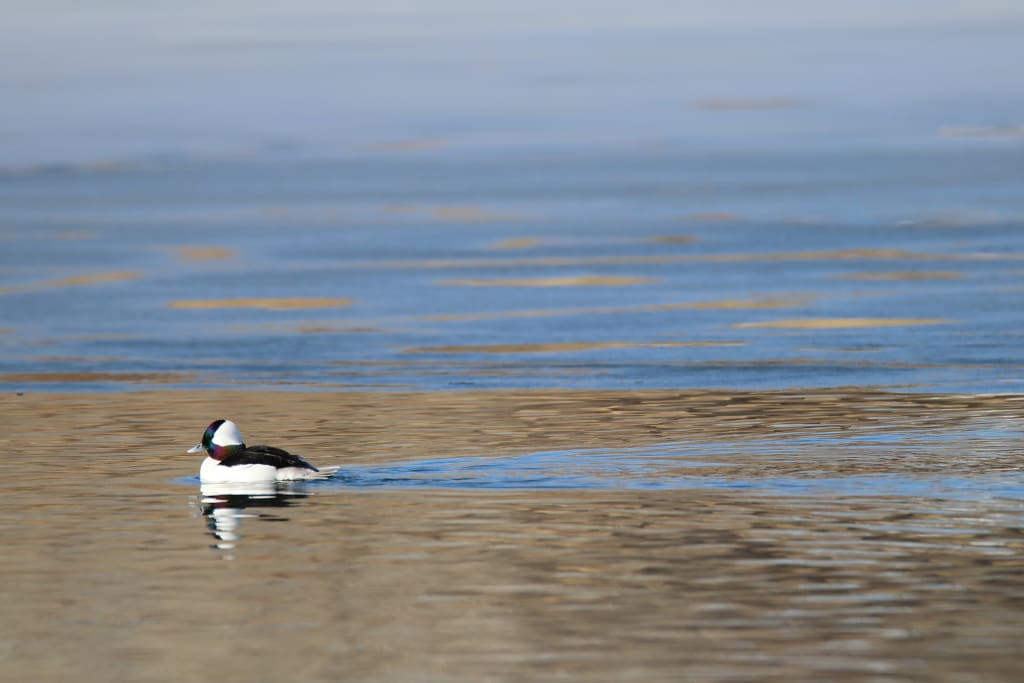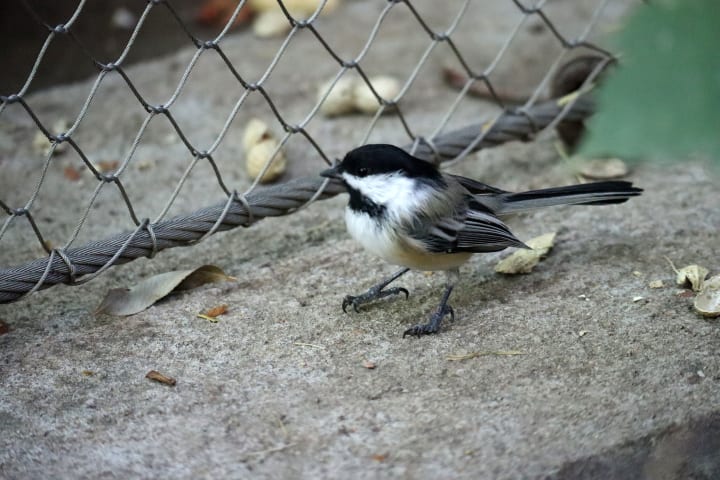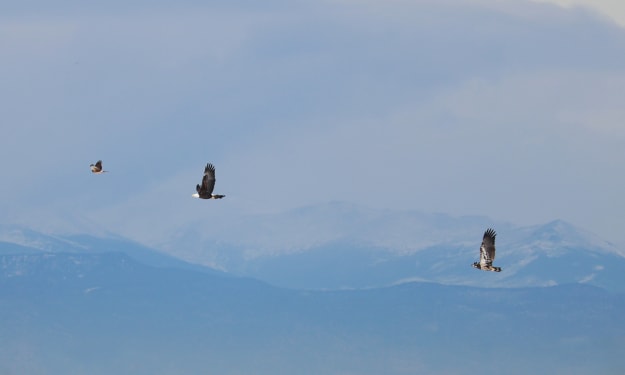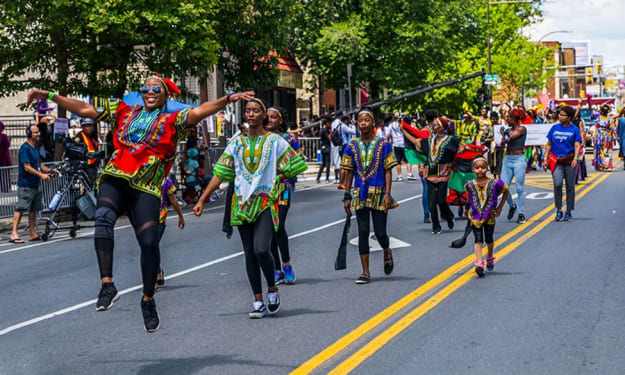Boobies, Dickcissels and Tits
Exploring the Etymology of Silly Bird Names

Very regularly when looking up a new bird that I'm not familiar with, I will stare at the name, and then immediately Google to make sure I'm not being pranked.
Let's do a quiz. Which of these names are not a species of bird?
- Satanic Nightjar
- Invisible Rail
- Andean cock-of-the-rock
- Splendid Fairywren
- Dickcissel
- Little Bustard
- Go-Away-Bird
- Penduline Tit
If you shrewdly sorted out that the are all legitimate bird names, then you are correct!
While we are mostly going to be discussing birds' common names, there is a standard system of scientific names for birds that follows a binomial nomenclature system, developed by Carl Linnaeus. This system includes a genus name followed by a species name, often derived from Latin or Greek. These names often describe characteristics or honor individuals. For example, the red-winged blackbird's scientific name is "agelaius phoeniceus". This loosely translates to “scarlet flock member” in Greek and is derived from the birds' social habits.
Outside of the scientific system, birds get their common names through a variety of historical, linguistic, and scientific processes. They can be named after physical characteristics, geography, behavior, sound, habitat or the person who first recorded information about them. Some birds have names that evolve from older languages. Common names can also split across region and language. For example, the bird known as a "robin" in Europe is different from the "robin" found in North America. Usually in these cases, defining specifics are added to keep the name from being confusing, so the North American robin is generally called the "American robin".
These names can be quite humorous and entertaining, such as loons, choughs, grackles and snipes. However, in some cases, the names may be outdated, offensive or inaccurate and should be changed. For example, the American Ornithologists Union (AOS) has changed the name of a duck from a derogatory term for Native American women to the long-tailed duck.
Read about the recent push to change eponymous bird names.
Let's examine some of the bird names that may inspire people to chuckle when they hear them:
Booby
The booby is not just a bird with a goofy name, but also an endearing member of the avian family. The name "booby" comes from the Spanish word "bobo," meaning “stupid” or “foolish.” Early sailors dubbed these birds "bobos" because of their awkward, seemingly clumsy behavior on land, where they are prone to tripping and tumbling. Despite their ungainly antics, boobies are skilled hunters, plunging into the ocean with remarkable precision to catch fish.
Puffin
The puffin is as amusing in name as it is in appearance. The name “puffin” is believed to be derived from the word “puff,” referring to the bird’s round, puffy body. Another theory suggests it could come from “puffen,” an Old English term meaning to puff or swell, describing the bird’s plump, rotund figure. Puffins, with their colorful beaks and comical expressions, are often called the “clowns of the sea,” a fitting nickname for such a whimsically named bird.
Kookaburra
The kookaburra’s name is as distinctive as its call. The name “kookaburra” is onomatopoeic (a naming based on imitation of natural sounds), originating from the Wiradjuri word “guuguubarra,” which mimics the bird’s iconic laughing call. The kookaburra’s hearty laughter is a familiar sound in the Australian bush, and its name perfectly captures the spirit of this jovial bird. The kookaburra’s call is often described as sounding like human laughter, adding to the bird’s charm and the appropriateness of its name.
Chickadee
Chickadees are small, sprightly birds known for their cheerful songs. Their name is onomatopoeic, mimicking the distinctive "chick-a-dee-dee-dee" call they make. This call is not just a random chirp but a sophisticated communication tool. The number of “dees” at the end of their call can indicate the presence of predators and even signal the level of threat. So next time you hear a chickadee, remember that it’s more than just a cute name—it's a nuanced avian language.

Bustard
The name bustard is believed to originate from the Latin phrase "avis tarda," meaning "slow bird." This name likely reflects the bird's relatively slow and deliberate movements. The Latin term was adopted into Old French as "bistarde" or "outarde," and from there it entered Middle English as "bustarde," eventually evolving into the modern English "bustard." The term "avis tarda" itself may have referred to the Great Bustard (otis tarda), a species found in Europe and parts of Asia.
Yellow-bellied Sapsucker
The yellow-bellied sapsucker is a woodpecker with a name that sounds more like an insult from a cartoon than an actual bird. The term “sapsucker” is literal, as these birds drill holes in trees to suck the sap. The “yellow-bellied” descriptor points to the bird’s yellowish underparts. Together, these elements form a name that’s both descriptive and delightfully silly, perfectly suited for a bird with such a quirky feeding habit.
Bushtit
The bushtit is a small, fluffy bird with a name that never fails to raise a few eyebrows. The name “bushtit” combines “bush,” referring to its preferred habitat of shrubs and bushes, and “tit,” an Old English term used for small birds. Despite its seemingly risqué name, the bushtit is a charming little bird, flitting about in flocks and bringing a touch of whimsy to the birdwatching experience.
Dickcissel
The unusual dickcissel name is another example of onomatopoeic naming, though there is some debate about this. Some say it comes from the song it makes while perched. The bird sings a sharp "dick, dick, dick" followed by a musical "ciss, ciss, ciss". Though some have argued that the name's origin is more complex than that, but this is the most commonly accepted reason for the dickcissel name.
What do you think? Does this call say dickcissel to you?
Bird names are a fascinating blend of history, linguistics, and humor. They capture the essence of the birds they describe, often in unexpected and delightful ways. From the bumbling booby to the laughing kookaburra, each name carries a story that adds to the rich tapestry of avian lore. Next time you’re out birdwatching, take a moment to appreciate not just the beauty of the birds, but also the quirky, whimsical names that make them even more enchanting.
About the Creator
Erica J.
Chronic-pain sufferer just trying to be healthy and enjoy life while bird lurking and photographing nature. Purchase photo prints, read birding blogs, or see hiking videos: https://linktr.ee/erica80hd
Enjoyed the story? Support the Creator.
Subscribe for free to receive all their stories in your feed. You could also pledge your support or give them a one-off tip, letting them know you appreciate their work.






Comments
There are no comments for this story
Be the first to respond and start the conversation.